Kurz vor dem Sandhausen-Spiel verschlug es uns an die Kollaustraße. Dort trafen wir uns mit Jos Luhukay zu einem kurzweiligen Interview. Hierbei sprachen wir vorrangig über die allgemeine sportliche Entwicklung des FCSP, aber auch die individuelle Entwicklung von Spielern.
Anmerkung: Wir konnten damals natürlich noch nicht ahnen, dass nicht einmal 10 Tage später der Spielbetrieb in der 2.Liga ruht und es vollkommen unklar verbleibt, wie es weitergehen wird. Daher mag es dem ein oder anderen sicher so vorkommen, als käme dieses Interview aus einer anderen Zeit. Wir möchten es Euch aber trotzdem nicht vorenthalten, denn Jos Luhukay hat viel Interessantes gesagt.
(Titelbild von Peter Boehmer)
MillernTon: Jos Luhukay, im April 2019, also vor fast einem Jahr, haben Sie ihre Arbeit als Trainer des FC St.Pauli aufgenommen. Mit welchen Zielen sind Sie damals gestartet?
Im Prinzip mit den gleichen, die ich jetzt immer noch habe. Wobei man natürlich immer aufgrund der sportlichen Situation realistisch sein muss, aber trotzdem die Ziele weiter anstreben sollte. Ich glaube, ohne Ziele hat man auch keinen Ehrgeiz etwas zu erreichen und den Erfolg auch ein wenig zu erzwingen. Eines meiner persönlichen Ziele bei Amtsantritt war mit dem FC St. Pauli innerhalb von zwei Jahren in die erste Bundesliga aufzusteigen. Daran hat sich nichts geändert.
MT: Und welche der gesetzten Ziele haben Sie bisher erreicht?
Natürlich muss man nur kurz auf die Tabelle schauen, um zu erkennen, dass es dieses Jahr nicht der Fall sein wird, das wir aufsteigen. Aber das wussten wir eigentlich schon von vornherein. Wir haben die Mannschaft in Bezug auf die Philosophie und von der Spielweise her komplett umgestellt und unsere Spielweise aus einer defensiven, kontrollierenden ganz in eine offensivere, risikobereitere Spielweise verändert. Bei dieser Umsetzung hat das Team in dieser Saison sehr viele positive Schritte gemacht. Natürlich haben wir uns diese Saison bislang viel zu wenig dafür belohnt. Hier möchte ich an die ersten beiden Heimspiele 2020 gegen Stuttgart und Dresden erinnern. Der VfB Stuttgart hat als Top-Team vielleicht zwei Chancen gehabt und wir hatten mehrere um das Spiel für uns zu entscheiden und am Ende kommt dabei ein Unentschieden heraus. Gegen Dresden hatten wir ebenfalls eine Vielzahl von Chancen, allein schon in der ersten Hälfte. So hätten wir punktemäßig und auch in der Tabelle bereits heute schon in einer beruhigenden Lage stehen können. Aber leider ist Fußball ein Ergebnissport und es werden Punkte benötigt, es gibt eben keine allein für die Art und Weise, wie Fußball gespielt wird. Ich hoffe, dass wir den positiven Trend aus den letzten Spielen mitnehmen und ausbauen können, um zum Ende der Saison noch in eine sehr gute Situation zu kommen.

MT: Wie bewerten Sie denn den Zustand des Teams zum jetzigen Zeitpunkt im Vergleich zum Zeitpunkt nach der Sommervorbereitung?
Ich glaube da hat sich sehr viel verändert. Mittlerweile befindet sich das Team konditionell und körperlich in einem hervorragenden Zustand. Wir haben in den letzten drei Monaten nicht einen einzigen Spieler mehr mit einer muskulären Verletzung gehabt. Wir mussten dahingehend viel Aufbauarbeit verrichten, nachdem wir zuvor eine Verletztenmisere hatten, die ich vorher in meiner gesamten Trainerkarriere noch nicht erlebt habe. Mitte November haben wir gewisse Änderungen vorgenommen, bei denen man heute, nach drei Monaten sagen kann, dass diese Änderungen Wirkung gezeigt haben. Das ist auf jeden Fall positiv zu bewerten, dass wir die Verletzungssituation zuletzt viel besser in den Griff bekommen haben.
„Wir haben in den letzten drei Monaten nicht einen einzigen Spieler mehr mit einer muskulären Verletzung gehabt.“
MT: Nach dem ersten Derbysieg und weiteren guten Spielen, durchlief das Team mindestens eine Ergebniskrise im Oktober und November. Was genau waren die Probleme zwischen dem Sieg gegen Sandhausen im September und dem gegen Wiesbaden im Dezember?
Es ist nicht immer nur ein Detail, aber natürlich hat die Verletzungsproblematik einen großen Einfluss auf die Stabilität des Teams gehabt. Denn die vielen Wechsel aufgrund der Verletzungen kommen einem Team nie zugute. Egal bei welchen Teams, wenn 3-4 Spieler ausfallen, dann ist immer ein Qualitätsverlust vorhanden. Wir hatten teilweise bis zu 10 Spieler wochenlang nicht dabei und trotzdem mussten wir Leistung abrufen und Punkte holen. Ich glaube aber auch, dass die Leistung des Teams und die Anzahl der geholten Punkte nicht immer übereinstimmte in dieser Phase. Wir haben auch in der Hinserie richtig gute Spiele bestritten in denen wir uns nicht belohnt haben. Das ist sehr schade, da wir trotz der vielen Ausfälle häufig noch attraktiven Fußball gespielt haben. Gerade bei unseren Heimspielen hat man gemerkt, dass die Fans teilweise vom Fußball angetan waren und mitgegangen sind, um uns ständig zu motivieren und anzutreiben. Ich glaube die Wechselwirkung zwischen Fans und Team ist auch ein Stück Respekt und Anerkennung dafür, wie wir diesen Weg gehen, um mit dem FC St. Pauli erfolgreich zu sein.
MT: Ein von außen zu dieser Zeit häufig genannter Vorwurf an Sie war die fehlende oder unglückliche Kommunikation zwischen Trainerteam und Spielern. Können Sie die Kritik nachvollziehen?
Ich bin da sehr nüchtern und realistisch. In dem Moment wo aus sportlicher Sicht die Ergebnisse nicht stimmen, ist medial an vielen Stellen etwas zu bemängeln. Ich weiß wie ich tagtäglich mit meiner Mannschaft arbeite, ich weiß was ich tagtäglich beeinflussen kann. Ich weiß aber auch was ich nicht unmittelbar beeinflussen kann. Auf all das was gesagt und geschrieben wird habe ich keinen direkten Einfluss. Ich fokussiere mich daher auf die Arbeit mit meinem gesamten Team. Diese Arbeit wird natürlich von außen anders wahrgenommen. Du wirst einfach häufig auf die Ergebnisse reduziert und das ist manchmal sehr hart und teilweise ungerecht. Aber damit muss man leben und deshalb bin ich da sehr nüchtern.
MT: Was für Medien konsumieren Sie denn, wenn es um den FC St.Pauli geht? Lesen Sie die lokale Presse oder gibt es überregionale Medien die Sie konsumieren?
Ehrlicherweise lese ich wenig. Mittlerweile bin ich schon so lange im Fußball dabei, dass es mir eigentlich nicht mehr viel ausmacht ob nun gut oder nicht gut über uns geschrieben wird. Ich kann damit keine Spiele gewinnen oder verlieren. Ich muss mich auf meine eigene Arbeit fokussieren. Mir ist vielmehr daran gelegen, dass es nicht über meine Person sondern über die Mannschaft und einzelne Spieler und auch den Gesamtverein eine positive Berichterstattung gibt. Dann weiß ich für mich selber, dass ich richtig gute Arbeit mache. Als Beispiel können wir die letzten zwei Wochen nehmen, mit dem Sieg im Derby und gegen Osnabrück, wo schnell aus einer negativen eine positive Berichterstattung wurde. Das geht im Fußball ganz schnell. Das muss man einfach wissen. Ich glaube, dass ich das für mich sehr gut einordnen und relativieren kann.

MT: Schauen wir uns die Spielweise mal ein bisschen genauer an: Sie hatten bereits gesagt, dass sie relativ viel im athletischen, aber auch im taktischen Bereich geändert haben. Auffällig unter Ihrer Leitung ist die taktische Flexibilität. Nicht nur von Spiel zu Spiel, sondern auch während der Spiele nehmen Sie nicht selten recht tiefgreifende Umstellungen vor. Haben Sie ihre Formation der Wahl noch nicht gefunden oder ist diese Flexibilität in der 2.Liga nötig?
Es ist für mich immer reizvoll gewesen, dass ein Team nicht nur eine Formation oder ein System spielen kann. Für mich ist wichtig, dass wir ein System haben, in dem jeder einzelne Spieler seine Qualitäten auf gewissen Positionen maximal einbringen kann und sich dabei wohlfühlt. Ob das dann mit einer Vierer- oder einer Dreier-Abwehrkette ist, finde ich nicht wichtig. Entscheidend ist erst zu schauen, wie wir zum Erfolg kommen können. Darauf basierend geben wir der Mannschaft einen Plan mit auf den Weg. Wir schauen da auf die letzten Trainingseindrücke und das letzte Spiel. Und natürlich schauen wir auch darauf, wie der Gegner auflaufen wird. So haben wir drei Komponenten, die wir beachten: Das letzte Spiel, die Trainingseindrücke und den kommenden Gegner. Und über diese drei Komponenten kommen wir zu einem Plan für das nächste Spiel. Die Mannschaft macht die Umstellungen mittlerweile immer besser mit und fühlt sich da auch wohl bei und das ist das Entscheidende. Es ist nicht so, dass ich sage, wir müssen mit drei oder vier Spielern hinten agieren. Die Mannschaft wird auch taktisch immer flexibler und besser darin Umstellungen schneller umzusetzen. Da war für mich das letzte Heimspiel gegen Arminia Bielefeld ein tolles Beispiel, wo das Team auch selbst gemerkt hat, dass sie mit einer Dreierkette zu viele Räume anbieten und dann sind wir zu der Entscheidung gekommen, bereits nach 20-25 Minuten auf eine Viererkette umzustellen. Wir sind eigentlich die gesamte Saison schon sehr flexibel und ich höre häufig von meinen Kollegen, dass sie nie so richtig wissen wie wir auflaufen. Ich finde das ist ein schönes Kompliment für unsere Arbeit, weil wir dadurch nie berechenbar für den Gegner sind.
„Die Arbeit wird von außen anders wahrgenommen.“
MT: Ein Gegenbeispiel der taktischen Flexibilität wäre der hsv, der ja unter Trainer Dieter Hecking ein recht starres 4-3-3 spielen lässt. Ist es für Sie daher einfacher gegen solche Teams zu spielen oder ist es allgemein schwieriger, weil Teams mit wenigen Umstellungen einen guten Spielstil gefunden haben?
Für mich persönlich ist es natürlich leichter, wenn ich im Vorwege genau weiß, wie der Gegner spielen wird. Dahingehend kann man auch die Trainingseinheiten vor den Spielen gestalten, wie man selbst gegen die Teams agieren möchte.
MT: Wird die Spielweise der gegnerischen Teams im Training simuliert?
Ja, wir spielen immer zwei Tage vor dem Spiel mit unseren eigenen Vorstellungen im Elf-gegen-Elf. Ein Team simuliert dabei das System und die Spielweise des Gegners, so wie wir es erwarten. Wenn man dann im Training direkt auf diese Spielweise eingehen kann, dann können wir da gewisse Vorteile ausschöpfen. Aber wir müssen es natürlich auch umsetzen. Da müssen wir in letzter Konsequenz und Zielstrebigkeit unsere Vorteile erarbeiten. Und das gelingt das ein oder andere Mal gut, aber auch mal nicht, obwohl man weiß wie der Gegner auflaufen wird.
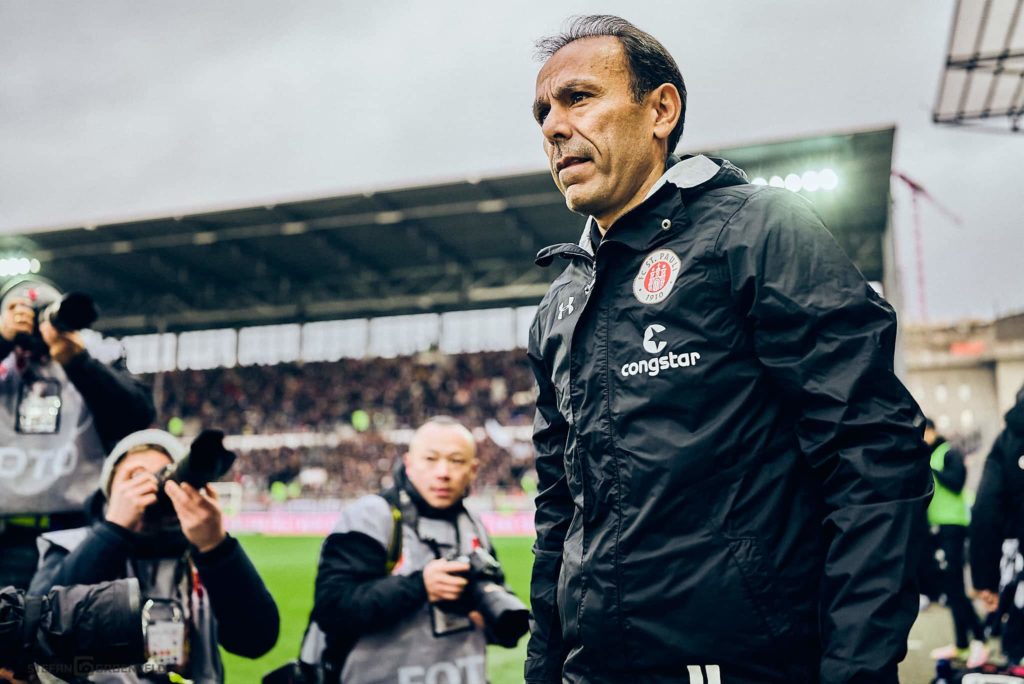
MT: Im Vergleich zu vorherigen Saisons ist beim FCSP wieder klar eine Spielidee bei eigenem Ballbesitz zu erkennen. Wollen Sie diese Idee etwas genauer beschreiben?
Dann würde ich vielleicht etwas zu viel verraten (lacht). Nein, ernsthaft, ich habe da überhaupt keine Geheimnisse. Wir wollen im Ballbesitz so schnell wie möglich unsere Offensive beleben und uns Möglichkeiten herausspielen. In dieser Saison erspielen wir uns ein Vielfaches an Möglichkeiten, aber wir haben daraus zu wenig Tore erzielt. Wenn wir diese Effizienz erhöhen können, dann zahlt sich das auch in der Tabelle aus. Bei Ballbesitz wollen wir auch flexibel agieren. Da ist es schon entscheidend, ob wir mit einer Dreier- oder Viererkette aufbauen. Aber vor allem unser Mittelfeld ist sehr wichtig. Da wollen wir nicht immer stur mit einem oder zwei festen Sechsern agieren, wir wollen da viel Bewegung und viele Rotationen haben, um den Gegner zu Entscheidungen zu zwingen, die dann für Unsicherheit sorgen.
MT: Wurden Sie trotz der intensiven Gegneranalyse diese Saison von einem gegnerischen Team taktisch komplett überrascht?
Ich denke bisher haben uns die Gegner taktisch noch nicht überrascht. Ich habe einen holländischen Assistenten im Trainerteam (Anm.d.R.: Hans Schrivjer, Gegner-Analyst), der sich die ganze Woche extrem auf den kommenden Gegner fokussiert. Tagtäglich sitze ich minimal eine Stunde oder sogar zwei Stunden mit ihm zusammen und spreche über unsere eigenen Vorstellungen, aber auch über die Stärken und Schwächen des Gegners. Das macht wirklich eine große Freude mit ihm zusammen zu arbeiten, weil er ein Trainer ist, der unglaublich fußballbesessen ist und viel Freude daran hat uns auf den Gegner vorzubereiten.
MT: Wurden Sie denn im Laufe der Saison auch von einem Spieler aus unserem Team besonders überrascht?
Ja, wenn man die Entwicklung der Mannschaft und der einzelnen Spieler sieht, dann sind da tolle Fortschritte im Ballbesitz aber auch bei Ballverlust zu erkennen. Wir haben bis zur Winterpause die wenigsten Chancen der Liga zugelassen und die meisten kreiert. Das war auch für mich ein wenig überraschend, weil wir tabellenmäßig nicht in den Top5 standen. Und trotzdem haben wir die meisten Möglichkeiten in den Umschaltmomenten geschaffen und die wenigsten Chancen zugelassen. Dann denkst Du, dass das Top-Werte sind, da sollte ein Team auch mindestens in den Top5 stehen. Aber da haben wir gesehen, dass wir zu ineffizient waren. Das ist schade, da sich die Mannschaft alles erarbeiten musste.
Wenn wir die Spieler individuell betrachten, dann hat natürlich Mats Møller Dæhli Eindruck hinterlassen. Dadurch ist es auch zu seinem Transfer gekommen. Ein sportlicher Verlust, den das Team jedoch gut aufgefangen hat. Darüber hinaus finde ich, dass sich Daniel Buballa mit seinen 29 Jahren in dieser Saison taktisch und fußball-inhaltlich stark verbessert und weiterentwickelt hat. Er war immer ein Linksverteidiger und hat diese Saison die besten und meisten Spiele als Innenverteidiger bestritten. Das macht er eindrucksvoll.
Wenn ich seinen Nebenmann betrachte, Leo Østigård mit seinen 20 Jahren, was der für eine Entwicklung in dieser Saison genommen hat, das ist unglaublich. Das konnte man vielleicht vor der Saison nicht so richtig einschätzen, aber er ist sicher einer der besten Innenverteidiger der Liga. Und das in seinem Alter, ohne jegliche Erfahrung auf diesem Niveau.
Ryō Miyaichi spielt bisher auch eine fantastische Saison. Es fehlen einzig ein paar mehr Tore von ihm. Er ist für mich auch einer der besten Spieler der Liga. Und ich finde Waldemar Sobota macht auch eine Entwicklung durch, die man vorher nicht absehen konnte. Er spielte früher immer Außenstürmer und bei mir ist er in eine zentrale Position gekommen und wenn man sieht wie er gegen Osnabrück das Tor erzielt hat, das war einfach klasse.
Oder Henk Veerman, der nach 11 Monaten zurückkam und in kürzester Zeit acht Saisontore erzielt hat. Ich möchte nicht daran denken, was gewesen wäre, wenn Henk schon ab dem ersten Spieltag zur Verfügung gestanden hätte. Henk erzielt nicht das dritte oder fünfte Tor. Henk macht wichtige erste Tore, wie gegen Bielefeld, den HSV oder Osnabrück. Natürlich habe ich hier den einen oder anderen nicht erwähnt. Allgemein sind das Spieler in einem gewissen Alter, bei denen man vielleicht diese Entwicklung nicht mehr vermutet hätte. Waldi ist 32 Jahre alt und spielt für mich wie ein junger Spieler, mit so viel Trainings- und Spielfreude. Das macht meine Arbeit so schön, trotz der momentan nicht sicheren Position in der Tabelle. Es ist einfach in der gesamten Mannschaft, aber auch individuell eine Entwicklung zu erkennen. Finn Ole Becker ist auch zu nennen, der im ersten halben Jahr so viele gute Spiele für uns gemacht hat.
Trotz der Niederlagen, die wir hatten, oder aufgrund der Tabellensituation hat mich die Arbeit mit der Mannschaft nie verunsichert, weil ich diese Entwicklung tagtäglich gesehen habe. Wir hatten die letzten Tage auch wieder drei Nachwuchsspieler im Training dabei mit Christian Viet, Moritz Frahm und Maximilian Franzke. Die haben auch wieder fantastisch mittrainiert. Diese positive Welle müssen wir mitnehmen. Denn letztes Jahr war es kein schönes Spiel in Sandhausen, habe ich mir sagen lassen…
MT: …nein, absolut nicht.
Das tut mir für unsere Fans immer weh. Wir müssen Reisestrapazen auf uns nehmen, aber unsere Fans noch viel mehr. Was die an Zeit investieren, um uns nicht nur bei Heimspielen zu unterstützen, ist unglaublich. Da hast Du das Gefühl, egal, ob es nun 100 oder 600 Kilometer entfernt ist, unsere Fans sind immer da. Und da würde ich mir wünschen, dass wir unseren Fans auswärts ein Glücksgefühl mit ins Gepäck auf den Rückweg geben können. Wir sind auswärts aber leider nicht so erfolgreich, das muss man einfach sagen. Mich haben viele Auswärtsspiele verärgert, weil wir viel mehr hätten herausholen können.
„Was Leo Østigård mit seinen 20 Jahren für eine Entwicklung in dieser Saison genommen hat, ist unglaublich.“
MT: Als Beispiele wären da Heidenheim und Dresden zu nennen. Wie kommt es zu dieser Diskrepanz zwischen Heim- und Auswärtsspielen?
Es
ist häufig so, dass wir von den entscheidenden Momenten, in denen wir in
Führung gehen könnten, eher drei oder vier brauchen, um auch wirklich in Führung
zu gehen. Bei erfolgreichen Spielen ist es häufig so, dass man bereits bei den
ersten Chancen trifft und in Führung geht.
Wenn ich an das Auswärtsspiel in Regensburg denke: Die kommen einmal vor unser
Tor und wir hatten davor drei, vier gute Möglichkeiten. In der zweiten Halbzeit
läuft Mats noch alleine auf den Torwart zu. Wenn solche Chancen nicht genutzt
werden, dann wird es einfach schwer auswärts zu punkten. In Heidenheim wird
eine Ecke flach reingespielt und es fällt das Tor, da fühle ich jetzt immer
noch Ärger und Frustration, weil wir in solchen Spielen als Sieger vom Platz
gehen müssen. Und in dieser Art und Weise sind einige Auswärtsspiele gelaufen.
Sie nannten noch Dresden, wo wir 3-0 führen und mit 3-3 vom Platz gehen und
nicht einmal die Dresdner wissen, wie das überhaupt zustande gekommen ist.
MT: In der fast schon legendären Pressekonferenz vor der Saison fiel das Stichwort „Wohlfühloase“ was dann medial sehr stark aufgekocht wurde. Hat sich da seitdem was geändert?
Zunächst war es nicht mein Ansatz, dass es so viel in der Öffentlichkeit bewirkt. Es war mehr mein inneres Gefühl, dass Ziele nicht richtig angestrebt und erreicht werden möchten und sich nicht gefragt wurde, wie man diese Ziele am besten erreichen kann. Und diese Komfortzone, die da entstanden ist, die hat mich irritiert und frustriert. Ich glaube das wir alle da auf dem bisherigen Weg einige Schritte vorwärts gemacht haben. Wir sind aber noch nicht da, wo wir sein möchten. Ich glaube, wenn man die gesamte Saison bis hierhin betrachtet, dann hätten wir zwischen Platz 5 und 10 stehen müssen. Aber wir stehen da nicht und müssen weiterhin vorsichtig sein. Das beschäftigt mich nicht so sehr, aber ich muss die Konstellation natürlich kennen. Ich werde die Mannschaft damit aber niemals belästigen, weil wir nicht mit Angst sondern mit Überzeugung auflaufen möchten und nicht auswärts nach Sandhausen fahren, nur um da einen Punkt zu holen. Wir wollen da gewinnen.

MT: Es gibt vor und nach jedem Spiel eine Pressekonferenz. Es gibt wöchentlich noch eine interne Presserunde. Es gibt Interviewtermine wie diesen hier. Das gehört alles dazu und gehört zum Job. Wenn Sie aber frei wählen könnten, wie oft würden Sie mit Medien sprechen wollen?
So
wie es jetzt hier beim FC St. Pauli ist, so würde ich es auch in Zukunft immer
machen wollen. Ich habe bei Hertha BSC gearbeitet und in Mönchengladbach, da
waren es viel mehr Medienauftritte. Das extremste war bei Hertha BSC, wo jeden
Tag 10-15 Journalisten und Kamerateams waren. Das war ein unglaublicher
Medienauflauf bei den Pressekonferenzen vor und nach jedem Spiel. Das war in
Mönchengladbach vor den Topspielen auch so, wo dann teilweise 60-70
Journalisten waren. Bei den Pressekonferenzen waren dann über 100 Journalisten.
Der Umfang war bei diesen beiden Klubs am höchsten.
Am geringsten war er in Augsburg. Aber das war aus sportlicher Sicht eine
unglaublich erfolgreiche Zeit als Trainer und auch als Mensch. Bei St. Pauli
sind natürlich auch jeden Tag Journalisten beim Training, aber es werden meist
Spieler interviewt. Ich kann mich daher viel mehr auf meine Arbeit
konzentrieren und das finde ich natürlich ganz angenehm. Ich fand es am schwersten
bei Hertha BSC Berlin, weil das sehr viel Zeit in Anspruch genommen hat. Und da
finde ich es hier in Hamburg viel angenehmer, sowohl aus Trainer-Sicht aber
auch aus menschlicher Sicht.
MT: Sie haben selbst das Ziel formuliert, dass der FCSP in der nächsten Saison aufsteigen soll. Was fehlt dem FCSP noch um ein Spitzenteam der Liga zu sein?
Ich glaube da müssen wir nicht viel drumherum reden. Wenn ein Spieler wie Henk Veerman direkt zu Beginn der Saison zur Verfügung gestanden hätte, dann bin ich mir sicher, dass wir allgemein eine ganz andere Qualität auf den Platz bekommen hätten, ohne hiermit seinen Mitspielern die Qualitäten abzusprechen. Henk hat einfach eine Abschlussqualität, die nicht viele Spieler in dieser Liga haben. Ich vergleiche ihn zum Beispiel mit Fabian Klos von Arminia Bielefeld. Wenn Henk in einem offensiven System wie unserem spielt, dann würde er problemlos mehr als 15 Tore pro Saison erzielen. Stellt Euch mal vor, Henk würde in der Saison 30 Spiele machen mit der Torquote und seiner Abschlussqualität. Das würde sicher einige Punkte mehr bedeuten. Auch Ryō Miyaichi hätte schon Spiele für uns entscheiden können. Es fehlt also in der Art und Weise wie wir spielen noch ein bisschen die Effizienz. Aber da mache ich niemandem einen Vorwurf. Da müssen wir einfach weiter dran arbeiten, denn wenn wir in die Top5 wollen, dann müssen wir 60 Tore oder mehr in der Saison erzielen. Da kommen wir momentan noch nicht heran.
MT: Letzte Frage: Sie haben bereits die Arbeit von Hans Schrijver herausgehoben. Würden Sie das Funktionsteam in dieser Richtung noch ausbauen wollen oder arbeiten Sie lieber in kleineren Teams?
Es ist egal, ob das Team klein oder groß ist. Entscheidend ist, dass alle im Team ihre Aufgabe haben und nicht verloren rumlaufen. Ich glaube, dass wir nicht sonderlich groß aufgestellt sind, aber auch nicht wirklich klein, obwohl ich die Zahlen der anderen Teams nicht kenne. Wir haben zwei Assistenztrainer, einen Torwarttrainer, dazu zwei Fitness-Coaches, neben Hans auch noch Jannik Niden als Videoanalyst, der auch fantastische Arbeit macht. Dazu kommen dann noch Teammanager, das Scouting-Team, drei Physiotherapeuten, zwei Zeugwarte und zwei Ärzte. Ich glaube nicht, dass man sagen kann, dass wir klein aufgestellt sind. Und damit bin ich sehr zufrieden.
MT: Jos Luhukay, vielen Dank für das sehr nette Gespräch!
(Das Interview führten Maik & Tim)
Alle Beiträge beim MillernTon sind gratis. Wir freuen uns aber sehr, wenn Du uns unterstützt.
MillernTon auf BlueSky // Mastodon // Facebook // Instagram // Threads // WhatsApp // YouTube
{:}{:en}Shortly before the match against Sandhausen, we traveled to the Kollaustraße. On arrival, we met Jos Luhukay for a quite entertaining interview. Within this interview, we mostly talked about the sportive development of the FCSP but did also focus on the individual development of certain players.
Note: We had absolutely no idea back then, that 10 days later the whole division would be put on hold with absolute uncertainty about if and when the season will proceed. Thus, one or the other reader might feel that this interview was conducted at a different time. However, we do not want to keep this interview for ourselves only as Jos Luhukay did say some interesting things.
(Cover picture by Peter Boehmer)
MillernTon: Jos Luhukay, almost a year ago, in April 2019, you started your job as manager of the FC St.Pauli . With which aims did you start back then?
In principle with the same, I still have now. However, due to the sportive situation, you always have to be realistic about your aims but nevertheless, keep on pursuing them. I believe, that without such aims you are not as eager to reach something and thus you have to force success a bit more. One of my personal aims, when I started this position, was to get promoted into the Bundesliga with the FC St. Pauli within two years. And nothing changed about that.
MT: And which of the set aims did you already reach?
Of course, you just have to take a look into the league’s table to find out that we will not get promoted this year. But this is something we already knew in advance. We did change the team completely with regards to their philosophy and in terms of our way to play. We changed our mode of play from a defensive, more controlling one into a more offensive and risk-taking one. And during these changes, the team took some very positive steps during this season already. Of course, up to now, we did reward ourselves much too less for doing this during this season. Let me remind you of our first two matches of this year against Stuttgart and Dresden. The VfB Stuttgart, which played here as a top team, did probably only have two real chances during the entire game while we did have plenty though to decide the match for us in the end, the result was a draw. Against Dresden, we also did have plenty of chances, already during the first half. Thus, with regard to our points and in the table, we could have been in a relaxing situation already. But unfortunately, football is a result-based sport and you need points which you don’t get just for the way you play football only. I hope that we can take and even enlarge the positive tendency resulting from the previous matches to get into a very good situation for the end of the season.
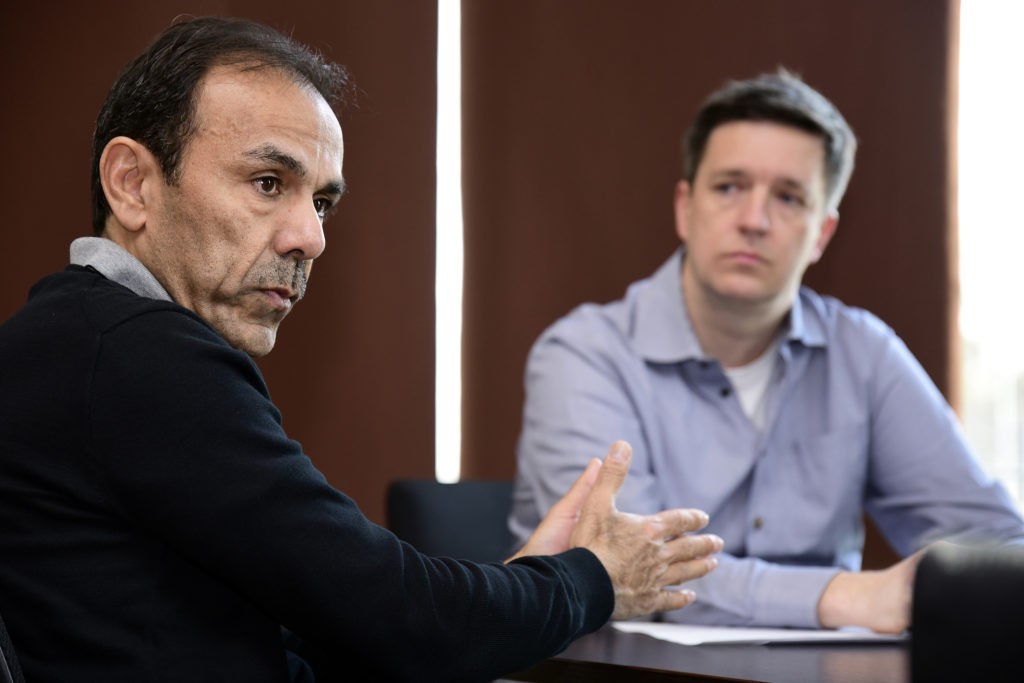
MT: How do you judge the state of the team as it is now compared to the time after the pre-season ended in summer?
I think a lot has changed since. In the meantime, the team developed an outstanding condition with regard to their fitness and physicality. We didn’t have a single player with a muscular injury within the last three months. However, we also did need to put much effort into building this fitness and physicality after we had to deal with a horrible scenario of injuries, something, I did not experience throughout my whole career as a coach until then. So, we did some changes during the middle of November of which you can say today after three months have passed, that these changes worked. Being capable to a get grip of and successfully fight the misery of injuries lately is definitely something to highlight.
„We didn’t have a single player with a muscular injury within the last three months.“
MT: After winning the derby of the first leg and some more good matches afterwards, the team had to go through a phase which was at least a crisis in terms of the match results during October and November. What exactly had been the issues in between after winning against Sandhausen in September and against Wiesbaden in December?
It’s not just simply a single aspect, but, of course, the injury issue did have a huge influence on the stability of the team. The many changes due to some injuries never contribute well to a team. No matter which team is affected, if 3-4 players are injured there’s always a drop in quality. We had to cope -sometimes- with ten injured players for weeks and nevertheless we had to deliver a top performance and score points. However, I also think that the performance of the team and the number of points scored didn’t always match during this phase. We also did play some very good matches during the first leg for which we didn’t reward us accordingly. This is a real pity because despite all the injured players we were still able to show some appealing football. Especially during our home matches, we could notice that the fans were quite attracted by our way of playing football and supported it accordingly to motivate and push us. I think that the close interaction between fans and team is also some sort of respect and appreciation of how we work at the FC St. Pauli to be successful.
MT: A frequent accusation against you from the outside was the lack of or the unlucky communication between the trainer team and the players. Can you understand this critique?
Well, I am quite sober and realistic in this regard. Whenever the sportive results are not as expected, the media start to criticize plenty of things. But I know how I work with my team daily and I know what I can influence on a daily basis. But I also do know what I cannot influence immediately. I do not have any influence on what is written or said about us. I rather focus on the work together with my entire team. But this work might get seen differently from an outside’s perspective. But frequently, your work is simply reduced to the results. This is sometimes very hard and partly unfair. But this is something you’ll have to live with and thus I am quite rational about it.
MT: But which media do you follow concerning the FC St. Pauli? Do you read the local press or are there any nationwide media which you read?
Honestly, I do not read very much at all. I am for quite some time working in the field of football so that it doesn’t really bother me any longer if something is written good or bad about us. I cannot really win a match because of an article. I have to focus on my own work. I don’t care what’s written about me, I rather care that whatever is written about the team, individual players or the club is written positively. Because then I can also see for myself that I did some really good work. For example, just have a look at the last two weeks. After the win in the derby and against Osnabrück, negative media coverage turned into a positive one. This goes rather quick in football. And that’s something you simply need to know. I think for me, personally, I can classify and qualify such things rather well.
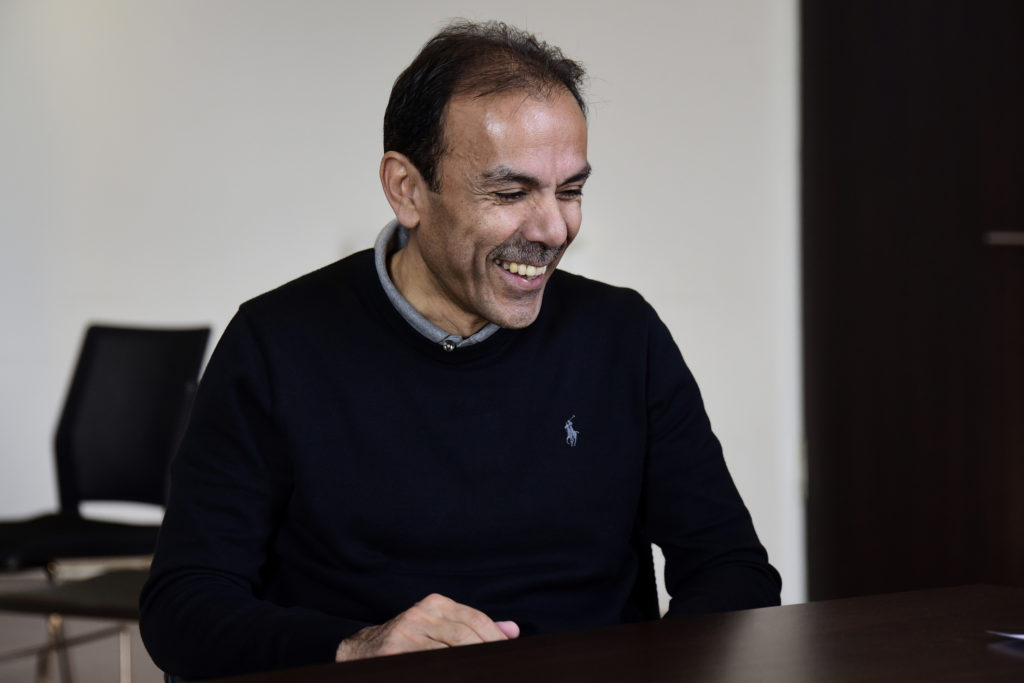
MT: Let’s have a look at your way of play with more detail. You did say already that you took relatively many changes in terms of athletics and tactics. What’s remarkable since you took over is tactical flexibility. Not just in terms of changes from one match to the next but also even within a match you sometimes apply some very major changes. Have you simply not found your preferred formation of choice yet or is this flexibility a necessity in the second division?
It is always tempting for me when a team can play more than one formation or one system only. To me, it’s important that we have a system in place to which every single player can add his qualities up to the max and that he’s feeling well by doing that. And if this is the case with a specific backline of three or four doesn’t matter. But what is mattering is that we always have a look first into how we can succeed. And following up on that, we provide the team with a certain plan. We take a look at the last training impressions and the last match. And of course, we also take a look into the possible line-up of the opponent. So, this is why we have three different aspects we’re taking into account: the last match, the impressions of the training and the next opponent. And by analysing these three aspects, we develop a plan for the next match. The team does now cope really well with all these changes and is feeling well and this is the decisive aspect. It isn’t that I say we have to play with three or four players in the back. The team is tactically getting more and more flexible and got better already in applying tactical changes faster. You could see this capability during the last home match against Arminia Bielefeld where the team itself realised that it was offering too many spaces in the back with a backline of three only and this is why we decided to change into a backline of four after 20-25 minutes already. Actually, we played the whole of the season with great tactical flexibility and I was told by many of my colleagues already that they never got any clue how our line-up would look like. I think this is a very nice compliment to our work because we are unpredictable for our opponents.
„The work is seen differently from an outside’s perspective.“
MT: An example to show the opposite in terms of tactical flexibility would be the hsv, at which coach Dieter Hecking is playing a quite rigid 4-3-3. Thus, is it actually easier for you to play against such teams or is in general more difficult as these teams did find a good style of play with only a few changes?
For me personally, it’s, of course, easier whenever I know beforehand what to expect from the opponent. Insofar, I can actually adapt my training units if I know beforehand how I would like my team to play against these opponents.
MT: Do you simulate the way of play of the respective opponent in your training units?
Yes, we always play a match eleven against eleven two days before an actual match to which we can add our assumptions. Thereby, one team is simulating the system and the way of play of the opponent as we expect it. And if you can react to this way of play and discuss certain things already during the training session, we can take some benefits out of this approach. But of course, we also have to transfer it into the actual match later. Because there we actually have to create our advantage with final consequence and determination. And from time to time this already worked well but sometimes it didn’t, although we knew how the opponent would line up.

MT: Compared to the previous season the FCSP regained a clear idea of play when in ball possession. Would you like to describe this idea a bit further?
I think I would actually reveal too much then (laughs). No, jokes aside, I do not have any secrets in this regard. Whenever we’re in ball possession we want to activate our offensive section as quickly as possible and aim to create chances then. In this season, we created several chances but did not score any goals out of these chances. If we could raise our effectivity in this regard, we could also benefit table-wise. When in ball possession, we would also like to act flexibly. It’s crucial then if we build up with a backline of three or four. But mostly our midfield is very important. We do not just want to rigidly play with two central defensive midfielders, we would like to have a lot of movement and rotation there to force the opponent into decisions which might create uncertainty for them.
MT: Despite your decent analyses of the opponents, did you actually get caught completely off guard tactically during the current season?
I think until now our opponents did not catch us off guard. I do have an assistant from the Netherlands in my team of coaches (note from the MillernTon.: Hans Schrivjer, analyses the opponents), who focuses for the entire week on the upcoming opponent. Every single day. I spend at least one hour, sometimes even two hours, with him and discuss what we expect but also about the strengths and weaknesses of the respective opponent. It’s great fun to work with him because he is a coach who is really into football and who really enjoys to prepare us for every single opponent.
MT: Did you actually get surprised about one of the players from our team during the current season?
Yes, when you look at the development of the team but also of some individual players, you can witness some great progress in terms of ball possession but also after a ball is lost. Up to the winter break, we allowed our opponents the smallest number of chances of the division but did also create the greatest number. This also came to me with a little surprise because we are not amongst the top 5 of the division. And nevertheless, we created the most chances after transition moments and allowed the smallest number of chances against us. And then you think that these are top values and that your team should be amongst the top 5. But then we realised that we were too inefficient. It’s a pity because the team did have to work for all of this.
If we look at players individually, of course, Mats Møller Dæhli left some impression. This is why he got transferred at all. A sportive loss which was however well taken and covered by the team. Furthermore, I think that Daniel Buballa did improve and develop a lot tactic-wise and also football-wise although he’s already 29 years old. He was always a left wingback but played the best and the most matches as a center-back this season. And he’s doing this impressively.
When I further look to the centre back next to him, Leo Østigård, who’s only 20 years old, it’s incredible to see how he developed during this season. This was something you couldn’t expect before the season, but he’s for sure one of the best center-backs of the whole division. And he’s that already at this young age without any experience at this level.
Ryō Miyaichi is also playing a fantastic season. The only thing that’s missing from him is a couple of goals. For me, he is also one of the best players in the division. And I think that Waldemar Sobota is currently developing in a way that was not expectable at all. He always played as a winger before and in my system, he’s playing on a central position and if you consider how he scored against Osnabrück it’s simply outstanding.
Or look at Henk Veerman, who returned after 11 months and who scored eight goals within no time. I wouldn’t even like to think what would have been if Henk could have been available since the first match of the season. Henk doesn’t score the third or fifth goal of a match. Henk scores the important ones, such as against Bielefeld, the HSV or Osnabrück. Of course, I didn’t name the one or the other. But in general, these are all players of a certain age of whom you’d never expect such a development. Waldi is 32 years old and for me, he’s playing like a young player with such incredible fun during the training and the matches alike. This makes my work really beautiful, even if the current position in the table cannot be considered as safe. Throughout the whole team but also individually, there’s so much development recognizable. Finn Ole Becker must be also named here who played so many good matches for us during the first leg of the season.
Despite the defeats we conceded or despite our position in the table, I never got insecure when I worked with the team because I could witness this development every single day. For the last three days we also had three rookies training with us: Christian Viet, Moritz Frahm und Maximilian Franzke. They joined the training in a fantastic way. And we have to ride on this positive wave now. Because last year, I have been told that it was a horrible away match against Sandhausen…
MT: …nope, absolutely wrong!
And I really feel sorry for our fans. We have to go through these travel hardships but so do our fans. It’s incredible how much time they spend not just to support us in our home matches but also in away matches. You get the feeling that it doesn’t matter if we have to travel 100 or 600km, our fans are always there. And I would wish that we could at least add a little feeling of happiness to their luggage on their way back. But unfortunately, we have to admit that we are not that successful away. And I got angry during plenty of away matches because we could have gained much more.
„It’s incredible to see how Leo Østigård developed during this season although he’s only 20 years old.“
MT: To give you an example we could name Heidenheim and Dresden here. How does this discrepancy between home and away matches actually happen?
Many times, we don’t need just one of these decisive moments to take the lead but three or four of them to actually take the lead. And during successful matches, it’s often happening that we take the lead already after one of the first chances of a match.
Thinking of the away match against Regensburg: They only needed one attempt to occur in front of our goal and score but we already had three or four promising attempts earlier. During the second half, Mats was approaching the goalie completely alone with the ball on his feet. If you don’t make use of such chances, it gets really difficult to score away. In Heidenheim, it just needed them one corner ball to score, I still get angry and frustrated because we should have won these matches. And many of our away matches happened in the exact same way. You also named Dresden where we were actually 3-0 in front to leave the pitch with a 3-3 draw later and where even the players of Dresden had no idea how this happened.
MT: Within the almost legendary press conference before the season started you dropped the keyword „oasis of wellbeing“ which was picked up by the media immensely. Did something change since then?
First and foremost it was never my approach that these words affect the public the way they did. It was rather my inner feeling that common aims were not strived for and nobody wondered how these aims could be reached in the best way. And this comfort-zone which occurred did irritate and frustrate me. I believe that we all made some progress on our way already. But we’re not where we want to be yet. I think, taken the whole season until now together, we should have been between the fifth and the tenth in the league’s table. But we are not and we still have to be careful. I actually don’t bother too much but I have to take notice of that situation. I will never mean to trouble the team with this issue because I want us to enter the pitch with conviction instead of fear because we do not travel to Sandhausen to score just one point there. We want to win the match.
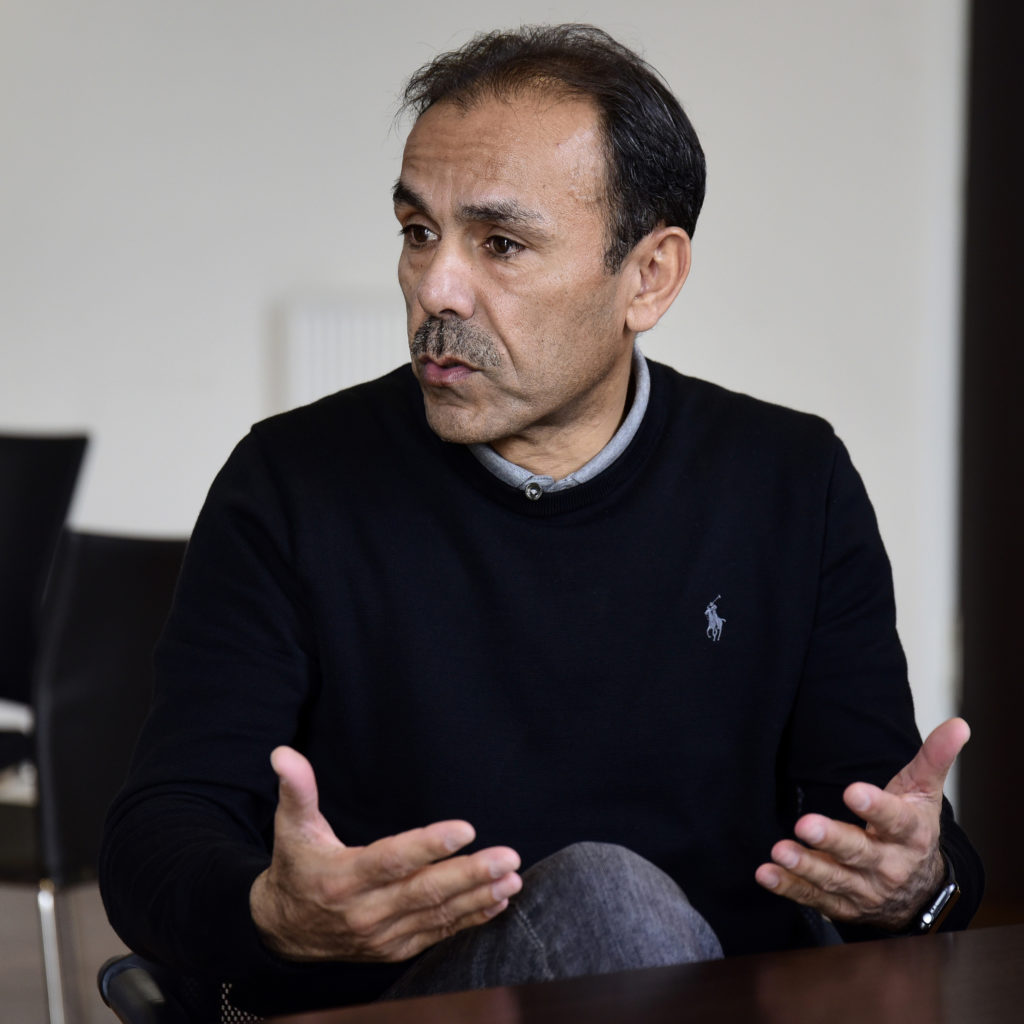
MT: Before and after every match, there’s a press conference. Once a week there’s an internal press meeting. There are interview appointments like this one here. This is all part of your job. But if you could freely decide it, how often would you actually talk to the media?
The way it is happening here at FC St. Pauli is also my wish for the future. I worked at Hertha BSC and in Mönchengladbach, where I had much more appointments with the media. The most extreme situation was at Hertha BSC where every single day, 10-15 journalists and cameras gathered. There was an incredible amount of media gathering at every press conference and after every match. The same was true for Mönchengladbach ahead of top matches where partly up to 60-70 journalists waited. At the press conferences, there were even more than 100 journalists. The amount at these two clubs was the highest.
The fewest amount was at Augsburg. But from a sportive perspective, it was an unbelievable time as a coach as well as a human. At St. Pauli, there are of course journalists every single day at the training ground but they mostly aim to interview players. Thus, I can focus much more on my own work and I think that’s really pleasant. I think it was the most difficult to deal with at Hertha BSC Berlin because it took so much time. And I think it’s so much more pleasant here in Hamburg both from a coach’s as well as a human’s perspective.
MT: You gave out the aim that the FCSP should get promoted after the next season. What does the FCSP still lack until being a top team of the division?
I think we can make it fast: If a player like Henk Veerman would have been available when the season started, I am pretty sure that we would have been able to deliver a whole different quality to the pitch without talking bad about his teammates. Henk does simply have a finishing quality which isn’t shared by many of the league. I would like to compare him to Arminia Bielfeld’s Fabian Klos. If Henk would play in an offensive system such as ours, he would without any problems score more than 15 goals per season. Just imagine, Henk would be able to play 30 matches this season with his goal index and his finishing qualities. I am sure we would have collected a few more points then. Also, Ryō Miyaichi could have decided matches for us. So, the way we are playing is lacking some sort of effectivity. But I do not accuse anyone because of that. That’s simply something we have to work on because if we want to get into the top 5 we need to score 60 goals or more per season. But we don’t get close yet.
MT: The last question, you already highlighted the work of Hans Schrijver. Would you like to add some more coaches to your team or do you prefer to work with smaller teams?
It doesn’t matter if a team is big or small. What matters is that every member of the team has their task and no one is lost. I think we are not really a big team but neither a real small one but I do not know the team sizes of the other clubs. We do have two assistant coaches, the goalkeeper’s coach and two more fitness coaches and aside from Hans, there’s Jannik Niden who does a fantastic job as our video-analyst. Additionally, we have two team managers, the scouting-team, three physios, two kit managers and two physicians. I don’t think it’s valid to say that we’re a small team. And I am happy about that.
MT: Jos Luhukay, thanks a lot, it was very nice talking to you.
(The interview was conducted by Maik & Tim, translated by Arne)
MillernTon Twitter //
MillernTon YouTube //
MillernTon Facebook //MillernTon Instagram //
If you like what we do here, here you’ll find the information on how to support us.
{:}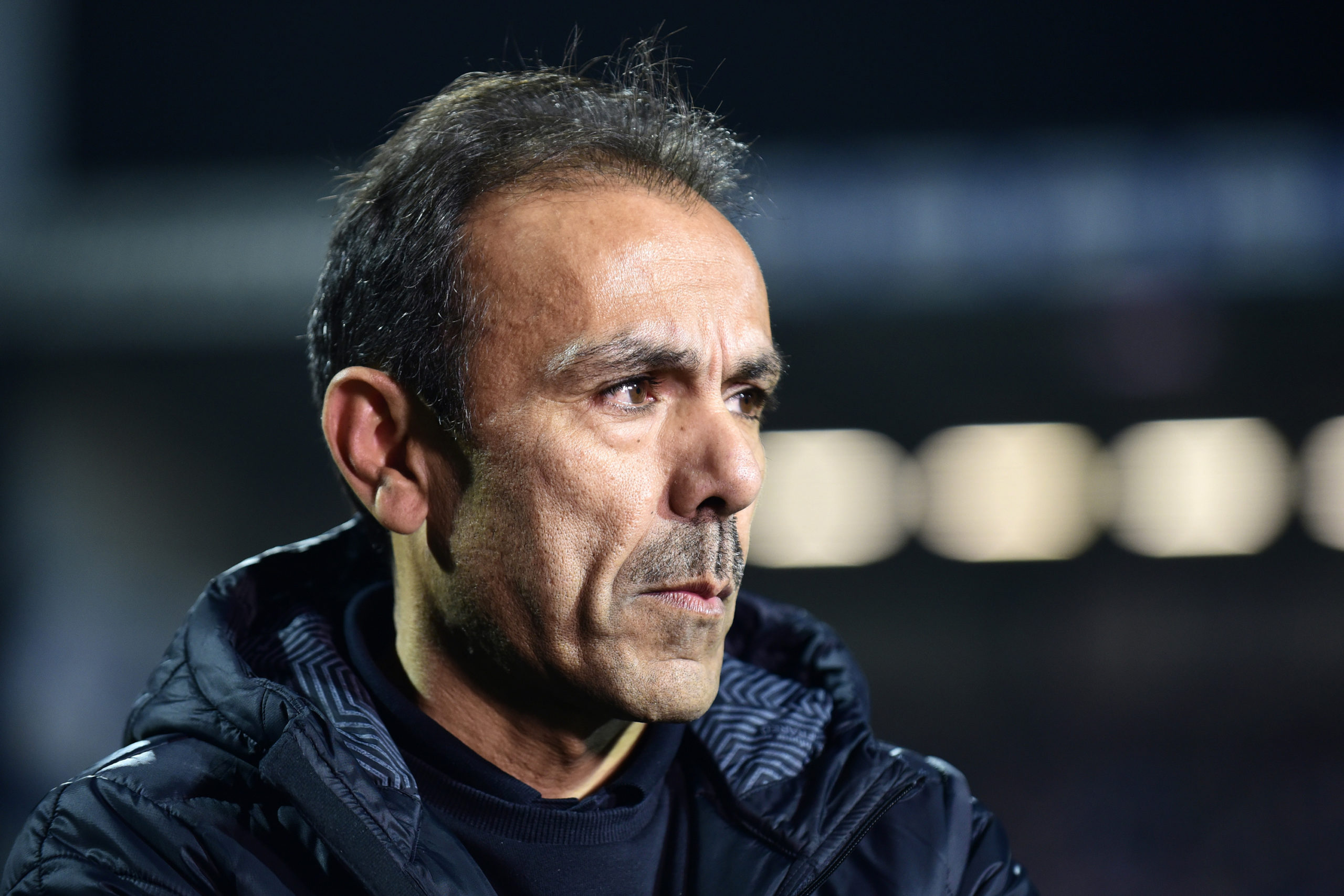

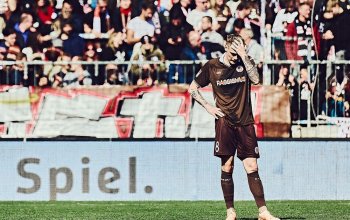
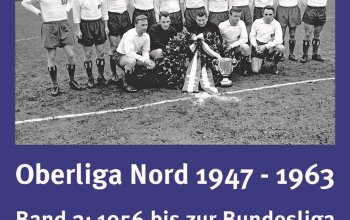
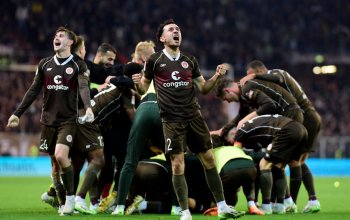
Tja, in der Tat wie aus einer anderen Zeit, als man sich noch mit Küsschen an der Kollau begrüßte…
Nettes Interview, das dennoch (erwartungsgemäß) die eine oder andere naheliegende kritische Nachfrage vermissen lässt.
Danke.
Danke für die Rückmeldung. Welche Nachfragen hättest Du dir denn gewünscht?
Zum einen die nach den konkreten Umstellungen im Training (Athletik Bereich) . Laut Truller habe man da ja “gar nicht soviel umgestellt“ und dann hätte ich gerne Luhukay mal damit konfrontiert gesehen, dass er bereits 5 Spiele mit dem Team absolvierte, eine komplette Sommervorbereitung hatte und dennoch die Spieler (auch jene, die nicht unter Verletzungen litten) lange Zeit maximal Luft für 60 Minuten hatten.
Die Umstellungen im Athletik-Bereich sind ja schon relativ leicht mit Personal-Entscheidungen zu verknüpfen.
Ist das denn gesichert, dass es nur „Luft für 60 Minuten“ gab? Für mich ist das recht eng mit der Verletzungsproblematik verbunden.
Klar, wir hätten da kritischer nachfragen können, aber haben es dann eher bei dem belassen, was für uns faktisch gesichert ist.
Alles gut. Ihr macht das schon immer recht ausgewogen [mit der Vereinsschere im Kopf 😉 ]
Faktisch gesichert? Ich habe keinen Zugriff auf die Meßdaten. Wurde damals (Stuttgart/Dresden) zumindest thematisiert und ist mMn. eben nicht (nur) auf die Verletztenmisere zurückzuführen.
Umstellungen im Personal alleine bringen ja nichts, wenn sich an der Methodik nichts ändert. Aber wir werden das hier ohnehin nicht abschließend erörtern können.
Prima Sache ansonsten von euch, aber das hatten wir ja auch schon 🙂
Ja stimmt, das mit fehlender Fitness zu Saisonbeginn ist ein Komplex, den wir so nicht besprochen und hinterfragt haben.Das hätten wir womöglich machen können.
Ich glaube schon, dass Personalumstellungen da schon einiges bewirken können. Aber vielleicht ist es auch allgmein die Umstellung im medizinischen Monitoring zu Saisonbeginn, das jetzt Früchte trägt. Denn für ein gutes Monitoring werden eben auch viele Daten benötigt.